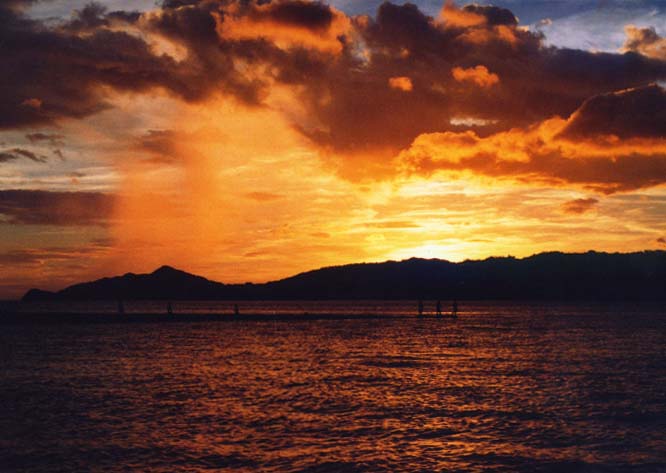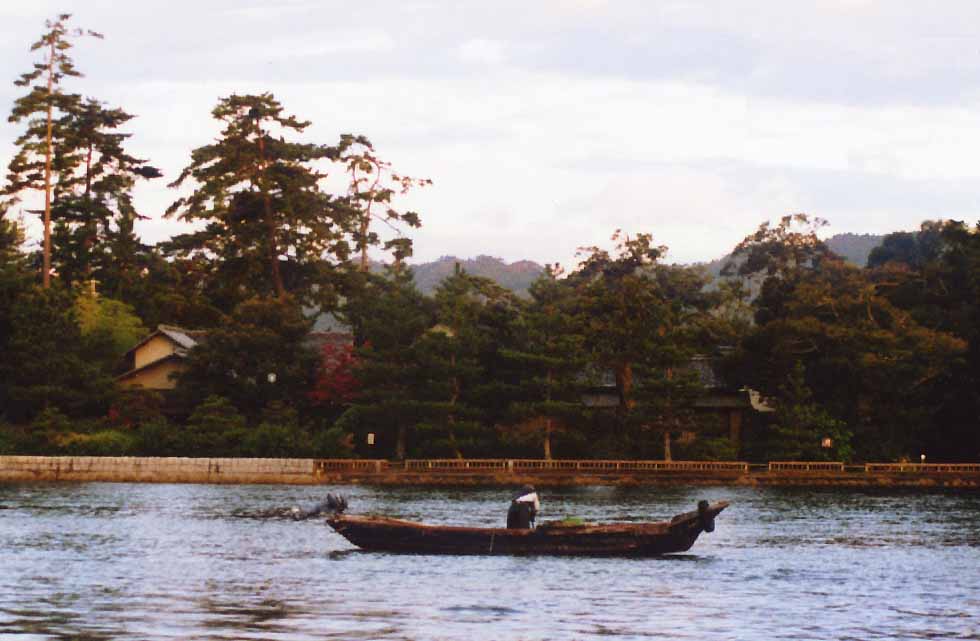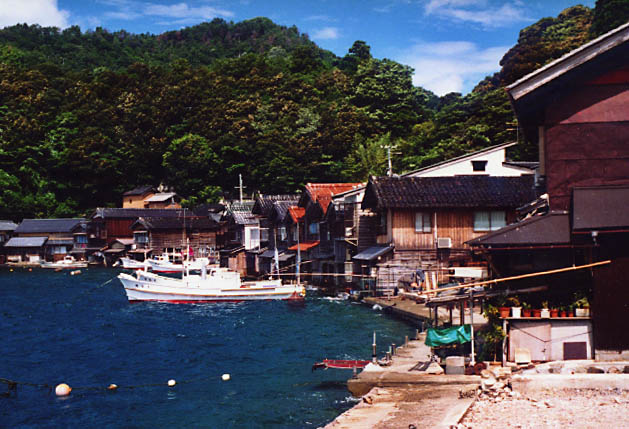
To: Newsletter
From: Peter Rivard
Subject: Summer vacation--part 1
Happy Continence Awareness Week for all you Australians! Remember, celebrate responsibly!
Hi, all,
Well, summer vacation is off to a slower start than planned. First, I had to stay close to home for the first week to deal with a bank error back in Chicago. Because of that, I missed the festivals I had wanted to see in the far north of Honshu, the main island. I was left with too little time to make the rest of the grand northern trip I'd imagined, so I made reservations at a traditional inn in Kyoto for Obon, the time when the dead come back to earth. The cemeteries are beautifully lit with candles in paper lanterns, and on the last night giant bonfires in the shape of Japanese characters (and a ship) are lit on five mountainsides around the city. The temples are open until late at night, everyone is out in the street, and it's a wonderful time to be in Kyoto. I thought I'd shift my car-camping trip south so I could end it at the terminus of a Kyoto commuter train line, but after a day, I was sunburned and sleep-deprived, so I decided to return home, rest, and improve my set-up for sleeping in the car. An important factor was that it was simply too damned hot to do anything at all except drive my air-conditioned car during daylight hours, so I couldn't imagine what I'd do on the rest of the trip.
I had a great time, though. Friday afternoon (the 9th), I left for points south, following the coast. Unless one takes the expensive expressways, it takes a staggering amount of time to drive any distance in this country. I think I averaged about 35 mph for five hours. However, I found a nice place to eat in a town near my goal, a famed scenic spot, and while I was chatting with the patrons, who knew their town's ALTs a little bit so I wasn't such a novelty, I asked for opinions on where I should go after the scenic spot. They seemed to think it was strange that I had set out without a plan, but they recommended a particular coastal drive. After dinner, I drove the last two miles to Amanohashidate, one of the three official "Great Views" of Japan (I've mentioned before the Japanese thing about official rankings of what in other countries are matters of individual opinion). Amanohashidate ("Bridge of Heaven") is a 2.5 km pine-covered sandspit almost entirely cutting off a large bay from the ocean. From a distance, it is indeed nice looking, and there are parts of it that, up close, are actually cleaner than landfill in America (which is exceptionally clean for any natural place frequented by Japanese). The beach along the exposed side of the spit isn't bad because the sand is cleaned of garbage daily by a large tracked sifter/vacuum machine. I arrived late, so I poked around the temple at one end, then walked a mile or so out onto the spit before deciding, hey, this looks a lot more comfortable than my car, and going back to get some sleeping things. After deciding not to be bothered by the small crabs running quickly up and down the sand, I found a nice dark spot not far from a restroom (odd note: incredibly high density of beautiful public restrooms--every hundred meters or less for several kilometers) and a beach shower, stashed my stuff, and took a midnight swim off the beach (yes, Dad, I skinny-dipped at the most famous beach in Japan). It was a hot night, and though there were a few very mild sprinkles, it was great to get into the water. I couldn't feel any animals in the water, but I noticed that whenever I moved my hands or my feet quickly, a swarm of blue lights buzzed around me. Quite striking really. I played with the glowing whatevers for a while, laid out for short nap on top of the water, and finally headed in for a nude walk up the beach to the shower, where I not only washed the salt off but washed away the day's sweat, grease, and sun block. Unfortunately, as I was setting up, it started to rain more heavily, despite the clear sky, so I dragged everything back and set up my bed in the car at about 1:30. I had only enough screen to keep one window open, so even when there was a breeze it was quite still in the car and unbearably hot, and the air-conditioner cycling on and off made it impossible to sleep with it running. It was far too hot to sleep, and the bed wasn't as comfortable as I'd have liked. About three o'clock, I got up to throw some cold water on my face at a nearby restroom and noticed that the sky was clearer, and it hadn't rained in more than an hour. I grabbed a tarp, some sheets, and a pillow, and decided to give the beach another shot. It was much more comfortable, but before I could get to sleep a strong wind came up, and although I could rest a bit I couldn't sleep much. It was quite pleasant, though.
 |
|||
|
Dawn on Amanohashidate
|
|||
Around sunrise, I decided to get up, go back for my camera, and photograph the spit.
 |
|||
|
Men standing in small boats were dredging for shellfish with small nets at the end of long bamboo poles.
|
|||
At the far end of the spit, on the opposite shore, the chairlift to the official viewpoint wasn't due to open until 8, so I climbed the trail in the growing heat (it was about 6:30 or 7 by then) and took in one of the official three greatest views in Japan in the prescribed manner.
 |
One stands on a granite viewing block with one's back to the bay and the sandspit and bends over to view the scene upside down through one's spread thighs.
|
||
Surprisingly, the view really did seem better that way--I'm not sure if it's the framing that completes the composition or the blood rushing to one's head that alters the perception. By the time I approached where I'd started at, it was about 8:30, well over 90°, and the beach was almost full (by ten, it would be unbearable in the sun). I'd walked about six miles, including the 500' climb to the viewpoint, and I was already a bit sunburnt.
Then, I set out on a drive the people in the restaurant had recommended to me, a coastal route around a dramatic peninsula. The coast around this area is mostly vertical cliffs and mountainsides plunging into the sea at 75° or 80°; the mountain slope doesn't become shallow enough to allow a road until three or five hundred feet above the sea. Imagine California's famous Highway 1 but with a much narrower, twistier road.
| Where there is a flatter area near sea level, there's an old fishing village on it, accessible now via sharp switchbacks from the high road, but even until 30 or 40 years ago completely cut off from the world except by sea. |  |
|
These are the villages that for hundreds of years existed in perpetual famine, in the worst years selling parents into indentured servitude or children into outright slavery for enough money to keep the rest of the family from starving to death for another year or two.
At that point, I was exhausted not only from sleep deprivation but from the unbearable heat of the day--I could exist outside my air-conditioned car for no more than about ten minutes before it became too miserable to be worthwhile. I decided to head home to improve my car-bed and rig up a second screen for the other window so I could get some cross-ventilation. I drove about another two hours before I became unable to keep my attention from wandering to whatever random thought was floating through my cerebellum--getting lost in detailed hallucinations for seconds at a time--and so decided to pull off onto a farm road to sleep under a bamboo grove--with the air-conditioner running--for an hour and a half. After Kyoto and a ceremony I have to attend on the 20th, I'll have time for my grand trip north--I've decided to stick to higher altitudes where it should be cooler. Besides, I've only been in some of those places when the high mountains were closed by snow, so I should be able to see a lot more now.
O genki de,
Peter
P.S.--Sociological note: drivers in the next prefecture over are no smarter than those in Fukui; the narrow roads through fishing villages, with their sharp blind turns, old ladies in the middle of the road,children in strollers left parked in the road by grandparents gossiping at neighbors' windows, and drainage canals lining both sides, were especially nerve wracking because of the locals speeding around blind corners in the middle or the road, failing to pull into their own lane even when faced with opposing traffic (me) pulled so far to the left as to be within an inch of the little canal or the old lady or the telephone pole (usually passing so close to these obstacles as to have to keep my left-hand mirror folded flat against the window). In fact, from the number of old pedestrians and bicyclists sporting bandaged heads and plastered arms (about a fifth of those on the street showed obvious signs of recent injury--absolutely unbelievable that it could be this bad, and even more unbelievable that nobody seems to be learning anything from it), as well as the number of dented cars, I'd guess that the drivers are significantly worse. I'll never understand how anyone can pay so little attention to an activity so obviously dangerous (if one isn't paying attention) as driving a car.
For information on copyright and using the images on these pages, please click here.